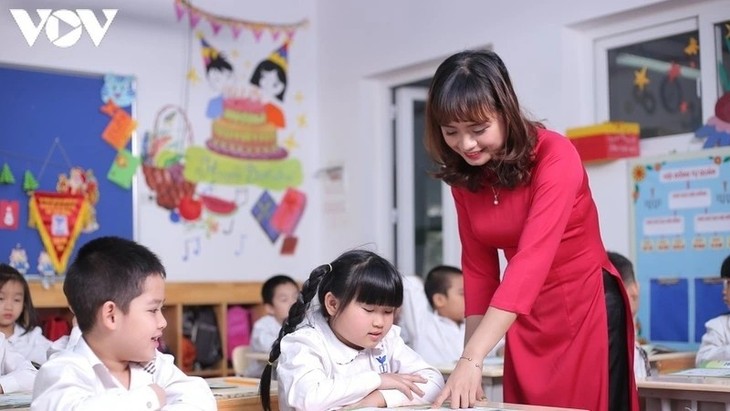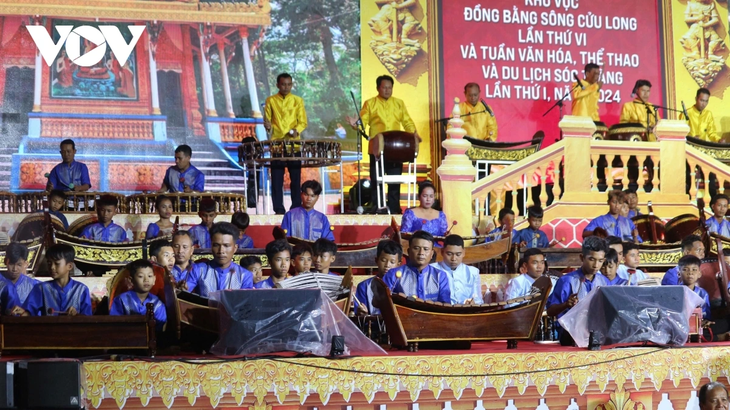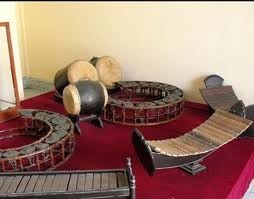 (Photo: VOV) (Photo: VOV) |
B: Well, this is a long story which dates back nearly 8 decades ago. In 1946, the World Federation of Teachers Unions (FISE) was established in Paris, France. Three years later, it introduced a charter, which aimed to safeguard the legitimate rights of everyone involved in the field of education. At the FISE conference in Poland in 1957, participating countries, including Vietnam, decided to designate November 20 as International Day for Teachers' Charter.
A: In September 1982, the Vietnamese Council of Ministers (now the Government) issued a decision, officially designating November 20 as Vietnamese Teacher's Day. Since then, it has been a significant day for the Vietnamese people to honor the tradition of respecting teachers. Not only students in schools but people from all walks of life express gratitude to their teachers, acknowledging the individuals who impart knowledge and valuable life lessons to them.
B: On this day, we express our heartfelt gratitude towards these essential contributors to education. Furthermore, Vietnamese Teacher's Day serves as a moment for the education sector to reflect and evaluate the effectiveness of educational initiatives and chart pathways for enhancements in teaching and learning methods.
A: Every year on Vietnamese Teacher's Day, various commemorative activities are organized nationwide, underscoring the deep-rooted significance of Vietnamese Teacher's Day.
B: Over the past week, VOVWORLD received more than 370 letters and emails from listeners of 33 countries and territories.
A: First, we’d like to thank M Saleem Akhtar Chadhar of Pakistan for your kind words. We are truly honored to be part of your daily life and to share Vietnam’s rich culture and global perspectives with you. Your description of VOV English as a "bridge connecting listeners around the world" motivates us to continue bringing you the best content. We deeply appreciate your support and look forward to keeping this connection strong!
A: We’d like to thank you all for your heartfelt congratulations on Vietnam’s victory at the Miss International 2024 pageant. Your letters reflect the pride and joy we all feel about this remarkable achievement.
B: Huynh Thi Thanh Thuy surpassed 70 contestants to secure the Miss International 2024 crown in Japan last week, becoming the first Vietnamese beauty to win this pageant.
A: In the Q&A section during the finale, Thuy received a question on the most significant global development that affects her generation’s educational system. And here’s her answer.
 Andrea Rubio of Venezuela crowns Huynh Thi Thanh Thuy of Vietnam as her successor at the 62nd Miss International pageant in Tokyo, Japan, on November 12. (Photo: organisers) Andrea Rubio of Venezuela crowns Huynh Thi Thanh Thuy of Vietnam as her successor at the 62nd Miss International pageant in Tokyo, Japan, on November 12. (Photo: organisers) |
B: Born in Da Nang City in 2002, Huynh Thi Thanh Thuy is currently a student at both the University of Foreign Languages under the University of Da Nang and Greenwich University Vietnam.
A: In his correspondence to VOVWORLD this week, Wu Li Ke from Guangdong, China told us that our program brings peace and relaxation to his busy life which inspires us to keep striving for excellence. Your appreciation for our dedication and hard work is the greatest reward we could ask for. Thank you for your continued support, and we promise to keep enriching your soul with meaningful content.
B: Also from China, Fan Hong Jie asked about the development of traditional craft villages in Vietnam.
A: Thank you for your question, Mr. Fan. Vietnam has implemented various initiatives to protect and develop traditional craft villages, including government policies to support artisans, investments in tourism to promote local crafts, and training programs for younger generations to learn traditional techniques. These efforts have preserved cultural heritage while improving livelihoods in many villages. We’ll explore this topic in depth in an upcoming program—stay tuned!
B: Chan Nari of Cambodia asked for further information about the music performance record in Soc Trang. This unique record showcases the cultural richness of the Khmer people in Vietnam, who have preserved their traditional music through festivals and performances.
 20 five-tone orchestras with 200 artists and musicians perform songs such as sorya, a-le, hon-zot, khlom, and Rom Vong krom dong khe.(Photo: Thach Hong/VOV) 20 five-tone orchestras with 200 artists and musicians perform songs such as sorya, a-le, hon-zot, khlom, and Rom Vong krom dong khe.(Photo: Thach Hong/VOV) |
A: 20 pentatonic musical ensembles involving 200 musicians participated in a performance of Khmer music in Soc Trang province on Monday.
B: The concert secured a Vietnamese record for "The largest Khmer pentatonic music performance in Vietnam" and to promote the Khmer community's rich cultural heritage by bringing this traditional folk art to a wider audience.
A: Tran Minh Ly, Director of the Soc Trang provincial Culture, Sports and Tourism Department, said: “By setting a record, we hope to preserve and promote the traditional cultural values of the Khmer ethnic group. This is a unique art form, admired by Khmer people nationwide. It is part of the daily cultural life of the Khmer. To set a new record, the musicians practiced diligently."
B: Pentatonic music, called Pinn Peat in the Khmer language, is a popular and long-standing Khmer musical genre in the southern region of Vietnam. The music, a form of orchestral music for religious rituals, is closely associated with Theravadan Buddhism in Khmer pagodas and hamlets.
A: The Khmer people in Vietnam’s Mekong Delta have inherited Angkor culture with influences from the local wet rice civilization and Chinese and Cham ethnic groups. But they have developed a distinctive musical treasure, notably the 5-tone musical ensemble and some unique musical instruments.
 The traditional ensemble includes percussion and wind instruments The traditional ensemble includes percussion and wind instruments |
B: The 5-tone musical ensemble performs ceremonial music in the pagodas and at major festivals. The 5-tone musical ensemble consists of nine or ten instruments, mainly wind, string, and percussion, including several varieties of xylophones, drums, cymbals, gongs, and fiddles.
A: The 5-tone musical ensemble expresses the inner feelings and attitudes of the Khmer towards genies, nature, and other people. Almost every Khmer pagoda has a musical ensemble. In the past ensembles only performed in pagodas. Now they also play at festivals and parties.
B: Ly Danh is a Khmer living in Soc Trang province said: “With government support, the life of the Khmer has improved. Pagodas and communities have formed musical ensembles to perform in the community. They don’t have to invite musicians from other hamlets. Each village, pagoda, or ward has a musical ensemble. We teach young people to play musical instruments in the ensemble.”
A: An ensemble must have roneat – xylophones, which are considered the lead high-pitched instrument in the ensemble – and Skor-thom - two big drums played with drumsticks. There are also flutes, fiddles, and cymbals. To play in the ensemble, the musicians must have a deep understanding of Khmer music, tradition, and culture.
B: Ly Phat is a musical instrument maker in Soc Trang province. He said: “I have more than 20 years of experience in making 5-tone musical ensemble instruments. At first my products were not too good but I’ve steadily improved my skills. One must be able to play music in order to make the instruments.”
A: Many Khmer pagodas have musical clubs and classes for children. They aim to inspire the children to learn Khmer music as a way to preserve it. Lam Quyet Thang is learning Khmer music at the Doi pagoda in Soc Trang.
Thang said: “I’ve been learning 5-tone orchestral music for 3 years. It was difficult at first. I’ve practiced a lot and now find it easier. Now I can play more fluently.”
B: In his email to VOV this week, Matsumoto Takuya of Japan expressed his interest in Vietnamese coffee.
A: Vietnam is one of the world’s largest coffee exporters, with major markets including the United States, Germany, Japan, South Korea, and China. Vietnamese coffee is known for its distinct flavors, and we’ll delve deeper into this topic in an upcoming feature on coffee culture and exports.
B: Paul Jamet of France shared his interest in AI applications in Vietnam’s agricultural production. AI is being used for precision farming, pest control, crop monitoring, and irrigation management. These advancements are helping farmers increase productivity and reduce waste. We’ll explore specific case studies in a future broadcast.
A: Thank you all for your letters, and keep them coming! Your engagement is what makes our programs truly special.